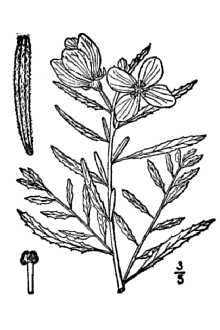Meriolix oblanceolata Rydb.
Scientific Name: Meriolix oblanceolata Rydb.

| General Information | |
|---|---|
| Usda Symbol | MEOB5 |
| Group | Dicot |
| Life Cycle | Perennial |
| Growth Habits | Forb/herbSubshrub, |
| Native Locations | MEOB5 |
Plant Guide
Use soil moisture sensors to measure the soil moisture of Meriolix oblanceolata Rydb..
Fact Sheet
Alternate Names
Yellow evening primrose, buttercup, and yellow sundrop
Uses
Halfshrub sundrop is very palatable for livestock and deer in range and pasture land, It is an attractive wildflower in landscape uses in rock gardens and meadows, Halfshrub sundrop can grow in gardens in part shade and full sun, , Use soil moisture sensors to measure the soil moisture of Meriolix oblanceolata Rydb..
Status
Please consult the PLANTS Web site and your State Department of Natural Resources for this plant’s current status (e.g. threatened or endangered species, state noxious status, and wetland indicator values).
Description and Adaptation
Adaptation
Adaptation
Evening Primrose family (Onagraceae). Halfshrub sundrop is a native, perennial, warm-season subshrub, shrub forb/herb which is more upright, bushy, and with numerous branches. Halfshrub sundrop grows into a large clump and up to 18 inches in height. The narrow leaves are 3 ½ inches long and alternate from each other with toothed leaf margins. Each small yellow flower has four petals up to 1 ½ inches across which includes the pistils (female organs) and eight prominent stamens (the male organs). The flowers tube is usually no more than 1 inch long. The flowers open in early morning and close in late afternoon and blooms from March to November. The old flowers can turn orange or pink and the plant leaves may stay green in mild winters. The mature fruit is a cylindrical capsule shape with small seeds enclosed. Adaptation Halfshrub sundrop occurs throughout Texas except in East Texas Piney woods and infrequent in open sandy or rocky places in the Panhandle and north-central Texas. Its range extends from Saskatchewan, Montana, Minnesota, Wisconsin, Oklahoma, Colorado, New Mexico, eastern-central Arizona, and south to Mexico. Halfshrub sundrop grows in clay and sandy loams, caliche, limestone, gypsum, and in well drain-soils. Established plants are extremely drought and heat tolerant. Lynn Pace Texas Parks and
Wildlife
Establishment
Halfshrub sundrop seed should be seeded early in the spring. Seed either by broadcasting or use grass drill equipped with a slick seed box. Mix seed with some type of carrier such as sand, if needed for proper distribution. Seeding at a depth of ¼ inch in a well prepared seedbed is sufficient. Broadcasting the seeds on uneven soil surface in pastures or rangelands can work. The halfshrub sundrop seeds could be included in a grass mix for pastures or rangelands.
Management
Halfshrub sundrop needs to be properly managed, because it can be eliminated by livestock or deer. If the fruit capsule is allowed to mature and seed fall to the ground, it can germinate in ten to fifteen days with proper conditions, such as moisture and warm soils. Harvesting seed with a combine can be difficult due to indeterminate inflorescence.
